BURKINA FASO

By Kurumi Onishi
On April 15, 2016, the International School Network visited the Embassy of Algeria in Tokyo for an interview with the Ambassador, His Excellency Mr. Mohamed El Amine Bencherif.

Algeria-Japan Relations
H.E. Mr. Bencherif commenced the interview by giving us a brief overview of the amicable relations between Algeria and Japan. He stated that diplomatic relations between the two countries began in 1962 when Japan officially recognized Algeria as an independent nation. H.E. Mr. Bencherif mentioned that this was especially meaningful to Algeria since the recognition date was only a day after Algeria’s proclamation on July 5th, 1962. The 50th anniversary of Algeria-Japan diplomatic relations was celebrated back in 2012. Currently, cooperations have been made through scientific, cultural, and economic exchanges, but especially in the field of natural gas. Strong relations are also evident from the fact that one of the overseas offices of JGC Corporation, a domestic oil refinery based in Yokohama, Japan, is located in Algeria. In fact, H.E. Mr. Bencherif had mentioned to us that two days prior to this interview, Sonatrach group, an Algerian government-owned company had signed business contracts with JGC Corporation and JGC Algeria Spa. He also reflected that 30 years ago, there were roughly 3,000 to 4,000 Japanese residents in Algeria. He commented that there is a Mitsui company in his town as well, evincing the close bond between Algeria and Japan. Relations have gone beyond international level, as the Algerian people provided support during the Great Hanshin earthquake in 1995 and more recently during the Great Tōhoku earthquake in 2011. This, H.E. Mr. Bencherif stated was to express their appreciation for Japanese aid during the Boumerdès earthquake in 2003. At the time, the Japanese government willingly introduced earthquake prevention education to Algerian schools and sent books made in Japan to teach Algerian students the way in which one could be safe during an earthquake.
Historical and Linguistic Aspect of Algeria
When asked about the languages spoken in Algeria, H.E. Mr. Bencherif began by mentioning that Algeria is “a very old nation”. When Algeria was a part of the Greek Empire and the Roman Empire, Berber was the “understood language” and the ethnicity of the Algerian people was “Amazigh”, which we now call “Berber”. Afrikaans was spoken in parts of Algeria and Tunisia and the Holy Quran was written in Arabic. H.E. Mr. Bencherif stated that the Quran brought a “new message of freedom”, which one could perceive easily. Later, the Algerian people suffered from the “harsh occupation of the Byzantine Empire”, yet simultaneously adapted to the culture and science of the Byzantine people. He commented that the Arabic languages brought “new faith, equality, justice, and science” and that the presence of the Algerian people were strong in Africa, as many people were migrating from the Middle East. Together, these people, formed great armies, which were mainly composed of Amazigh people to fight against the Spanish army. By the eighth century, the Amazigh people acquired a “high level of culture and civilization”. In recent years, through traces of Arab and Berber DNA, architects and researcher proved that the architectures in Andalucia, Spain were influenced by Algerians.
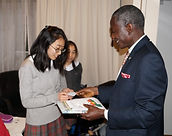
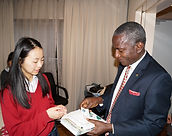
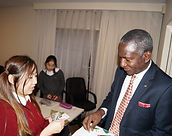
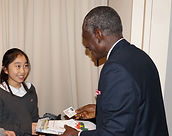
After Algeria attained independence, natural resources were used as means of developing their economy. Yet, developing the Arab language was a “fundamental process”, H.E. Mr. Bencherif spoke. During occupation, foreign languages were brought to Algerian soil; however, partly for the purpose of maintaining its cultural and linguistic heritage, Berber s currently maintained as the second language. During the last revision of the Algerian constitution, the document was written in both, Arabic and Berber. H.E. Mr. Bencherif commented that the two languages were not completely different or separated. Generally, all Algerians speak Arabic, but in some areas, people speak both or even communicate by mixing the two languages. Many speak French, due to the extensive French occupation. The occupation had also made a chance to “open many perspectives through skills and sciences from the outside”. By 1912, the Amazigh cultural area stretched from the mediterranean coast to the north of Burkina Faso, Libya, and Niger. In actuality, even in Japan, the Amazigh language is taught at a language course in Sophia University.
Cultural Values
When asked about the cultural values of the people in Algeria, H.E. Mr. Bencherif began by explaining the “beautiful symbol” that the Algerian flag possesses. He explained to us that the origin of the flag is “ideological” and that it “expresses the feeling of the Algerians and their natural-political system. The national flag of Algeria is composed of three colors: red, white, and green. The white color depicts peace and the green color, as well as the star and crescent moon are a representation of Islam. The red is an indication of the blood shed by the Algerians when fighting for the nation’s independence. H.E. Mr. Bencherif mentioned that the flag is a depiction of the “principles and values of the Algerian revolution”. After the independence, administrative divisions were established (similar to that of a prefecture), in which the municipality must be elected by the people of Algeria. This is derived from the strong belief that ‘decisions should be made by the people’ and that “people should establish their own system”.
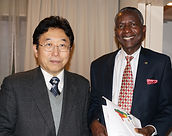

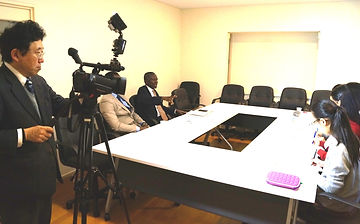

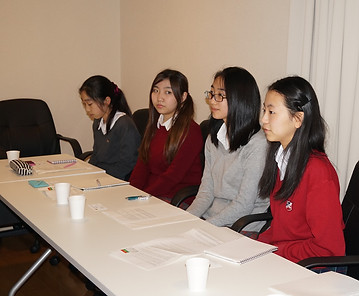
Algerian Qualities
H.E. Mr. Bencherif stated that the main qualities of the Algerian people is that they are “generous and spontaneous” and that they regard “integrity” to be an element of importance. “If you approach [an Algerian person] with good manners, you can do anything with him; but, if you act aggressively, he will be more aggressive than you,” he commented. The general characteristic of the Algerian people, H.E. Mr. Bencherif says is that they “don’t hide [their own] impressions and ideas” and that they “directly express sentiments, regardless of whether the person is a friend or an enemy”. Due to this, they are “easy to deal with, even [among] Algerian officials”. Furthermore they are “all black or white” and because of that, Algerians “appreciate international relations, since intentions and positions are very clear, as their values and principles are the basis of cooperations”.
Tradition
According to H.E. Mr. Bencherif, Algerian people are generous about tradition, which he associates and relates to the Japanese people’s “strong personality”. He believes that this strong sense of identity awareness derives from a feeling of chagrin due to French defeat after a long, tiresome war. During the first period of the twentieth century, Algeria suffered from cultural oppression. “Despite the occupation, Algerians resisted that by developing and maintaining culture,” H.E. Mr. Bencherif commented. He asked, “What does ‘history’ mean to us?” To this, he answered, “The publications of our history and culture prove one thing. [That] we are different. We have our own personality. We have our own history”. When questioned about the major consequence of modernization, ‘the fading of culture and tradition’, he stated, “We are modern people, but despite the appearance of modernization, at the familial, cultural, and social level, we are very close”. H.E. Mr. Bencherif also commented that this could be said about the situation in Japan as well.
Advancing Technology
In regards to the world that is currently operated by increased technology and the potential growth in this field of works, H.E. Mr. Bencherif feels that increased technology is “very good, but there could be bad things”. Simultaneously, he believes that “zero risk is nonexistent” as the world “cannot deal with a narrow circle”. As an example, H.E. Mr. Bencherif mentioned the “revolutionary invention” of the printer. Yet, in order to produce these products, more natural resources would be required and they are scarce. The consequence of this, he states is the “development of colonialism”. According to him, technology is all dependent on its use. “If we use technology to improve development, it could be good. However, it can be used with bad hands,” H.E. Mr. Bencherif began, “The best solution is a collective one. We must limit the negative effects and to do this, we should promote international cooperation, but not at the bilateral level. The best way is to develop relations at the multilateral level. It is an international problem; therefore, we must work ‘hand-by-hand’”. In addition to this, H.E. Mr. Bencherif praised Japanese effort of creating a national ensemble, “The Day of Tsunami”. As a response to the Japanese initiative, all members of the United Nations voted for this effort of remembrance.
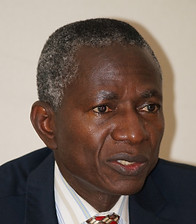
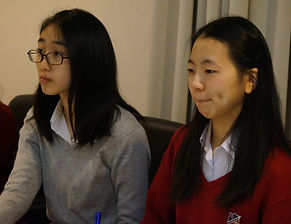
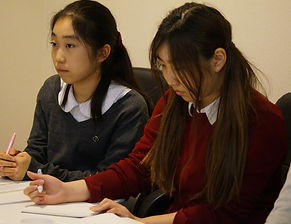
First Step Towards World Peace
When asked what he views as the ultimate first step to world peace, H.E. Mr. Bencherif first stated that it is “very difficult to change the shape of the world”. “Since the fall of the Berlin wall, the world is dominated by one super power. We need a more balanced wall to reduce the differences between the development of the developed and developing countries”. As a solution, he believes that we must “give education to all people” because “an educated person can develop himself and can [eventually] develop the world” as well. Therefore, he hopes that there would be increased participation of women in decision-makings, since “girls hold the future of the world”.
“The world will continue to be dangerous. [Therefore,] a peaceful world is not possible because the international system is made to be run by sovereign states,” H.E. Mr. Bencherif firmly stated. “World peace is difficult and it is a very rough challenge. So, we must support the governments that manage the world through social and economic means to promote justice,” he added.
The Ambassador’s Childhood
H.E. Mr. Bencherif was a child at the time of war revelation. Thus, it was not rare for him to witness the French army and military vehicles on the streets. He mentioned that Algeria was separated into two groups: the Europeans, who lived well and the Algerians, which composed the majority but lived poorly. At school, he learnt two languages: French and Arabic and according to him, learning these languages were challenging, since the languages were so different. There were about 62 students at school. That was when he began believing that the most important thing was to “adapt a democratic education” and to “open schools for all children without distinction”.
When he was eight years-old , giving from what the environment he had been living in, H.E. Mr. Bencherif visualized his future as a soldier. Due to the images during war liberation, he figured that becoming a soldier would be equivalent of being a “strong man”. Then, he shared to us a secret that he had never discussed with the press. “For a long time, I didn’t imagine myself dying old,” he began, “I imagined myself as a young soldier, fighting against enemies on the battlefield for the freedom of the country. So, my deepest dream was to die young, at the battlefield. I didn’t imagine myself as an Ambassador”.
When he was young, H.E. Mr. Bencherif enjoyed games such as tag and soccer. Soccer, especially, was a popular sport during his time “because there were no other sophisticated means. I used to play football each day, after school for two to three hours”. As his interest for soccer still continues to this day, he expressed his joy over the fact that the coach of the Algerian national soccer team is now in the Japanese national team. Because of him, H.E. Mr. Bencherif believes that many victories would be celebrated at the next World Cup.


Ambassador’s Goals
As an Ambassador, H.E. Mr. Bencherif’s main goal is to “cooperate closely” and “increase relations in the economic field, investments, fishery, solar energy, substantial development, and mechanics”. Furthermore, he would like to “continue cooperations in the fields of gas and petroleum, as well as in the scientific and technical fields”. He hopes that the Japanese representatives would provide the Algerians with “huge knowledge” and he aims to “develop exchanges between the people”. Through this, H.E. Mr. Bencherif feels that the people of both sides could be more “comprehensible” and that this could be attained through cultural exchanges such as introducing of artists, singers, theatres, and music. He would like to work more closely with Japan and suggested that Japan translate some of Algeria’s most finest and famous books in Japanese to gain knowledge of “the feeling and thinking of your counterpart”. Through enrichment, Algerian people and Japanese people could “know each other” and it would hopefully “help them to be closer”.
Ambassador’s Message to the Readers of International School Network
As a message to our readers, H.E. Mr. Bencherif stated that “firstly and [most] honestly, be proud of your history, country, and civilization because you are a model for us, now and then especially during the Meiji era”. He expressed his admiration for the rapid modernization process that took place during Japan’s Meiji period. He was especially amazed by how the Japanese people were able to “capture modern and western skills, while preserving culture and tradition”. “We too, tried to develop and keep our personality after the independence,” H.E. Mr. Bencherif added. He hopes for Japanese people to “discover the Islamic world, as we share many values”. Additionally, regarding globalization and the increasing technology in the modern world, he commented, “it is important to build a very balanced society. Technology is not natural. We should have different social relations and create a different society that is similar to the original society. [As a message to you all,] ‘disturb the equilibrium of our society’”.
Reported by
Kurumi Onishi
Participants
Madoka Nishina 12th Saint Maur International School
Kate Shimizu 12th Seisen International School
Kurumi Onishi 11th Saint Maur International School
Karen Nishina 6th Saint Maur International School

